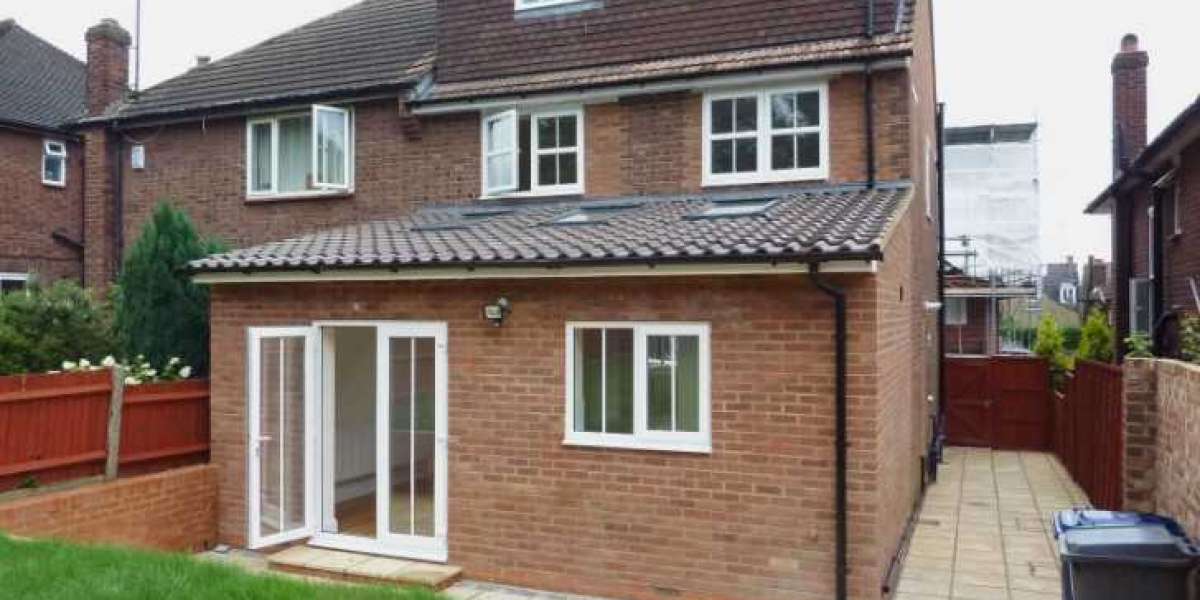Expanding and improving your living space is an exciting endeavor. Whether you're looking to add extra rooms, create a home office, or enhance the overall value of your property, house extensions and loft conversions offer versatile solutions. In this blog article, we will explore the benefits, considerations, and options related to house extensions and loft conversions. From the specialists in Wandsworth to the experts in Wimbledon, we will cover everything you need to know about transforming your space.
House extensions involve adding extra space to your existing property. They can be single-storey or double-storey, and they offer the flexibility to create additional rooms, expand living areas, or accommodate specific needs. House extensions allow you to maximize the potential of your property and tailor it to your lifestyle requirements.
Types of House Extensions
2.1 Single-Storey Extension:
A single-storey extension involves extending your home on the ground floor. It can be an excellent option for adding a spacious kitchen, dining area, or a multifunctional living space.
2.2 Side House Extension:
A side house extension expands the width of your property. It is ideal for creating larger rooms, such as a home office, study, or utility room.
2.3 Rear Extensions:
Rear extensions are built at the back of your property and can significantly increase the living space. They are commonly used for creating open-plan living areas or extending existing rooms.
2.4 Basement Conversion:
If you have an existing basement, converting it into a functional living space can be a cost-effective way to add extra rooms. Basement conversions are popular for creating entertainment rooms, gyms, or additional bedrooms.
2.5 Kitchen Renovation:
Upgrading your kitchen can also be considered a form of house extension. By remodeling and expanding your kitchen area, you can create a modern and functional space for cooking, dining, and socializing.
2.6 Glass Extensions:
Glass extensions are a contemporary and stylish option that allows natural light to flood into your home. They provide a seamless connection between indoor and outdoor spaces, creating a bright and airy atmosphere.
2.7 Timber Clad Extension:
Timber cladding is a popular choice for house extensions, offering a warm and natural aesthetic. It can be used to create a striking visual contrast with the existing structure while providing insulation and weather protection.
2.8 Double Storey House Extension:
Double storey house extensions involve adding an additional floor to your property. This type of extension provides ample space for multiple rooms, such as bedrooms, bathrooms, or a home office.
Benefits of House Extensions:
-Benefits of House Extensions:
- Increased living space: House extensions provide additional room for you and your family to comfortably live and enjoy your home.
- Enhanced functionality: You can customize the extension to suit your specific needs, whether it's a home office, a playroom for children, or a guest bedroom.
- Added property value: House extensions can significantly increase the value of your property, making it a wise investment for the future.
- Avoiding the hassle of moving: Instead of going through the process of selling your current home and finding a new one, a house extension allows you to stay in the neighborhood you love while still gaining the space you need.
- Personalization: House extensions provide the opportunity to design and create a space that reflects your personal style and preferences.
- Improved natural light and views: Well-designed extensions can incorporate large windows or glass panels, allowing plenty of natural light to enter the space and offering beautiful views of the surroundings.
- Cost-effective solution: Compared to moving to a larger property, house extensions can be a more cost-effective option, especially when considering associated costs such as stamp duty, legal fees, and removal expenses.
Considerations before House Extensions:
4.1 Planning Permissions:
Before undertaking a house extension, it's essential to check whether you require planning permissions or if your project falls under permitted development rights. Consulting with a professional and experienced house extension specialist can help navigate the planning process smoothly.
4.2 Design and Build:
Careful consideration should be given to the design and layout of the extension to ensure it seamlessly integrates with the existing structure and meets your functional requirements. Hiring an architect or a design and build team can help you create a well-designed and cohesive space.
4.3 Pricing and Budgeting: Setting a realistic budget and understanding the potential costs involved in your house extension project is crucial. Factors such as materials, labor, permits, and any additional features or finishes should be considered.
House Extension Specialists in Wandsworth:
When it comes to house extensions in Wandsworth, it's essential to work with reputable and experienced specialists who can bring your vision to life. Here are some qualities to look for in house extension specialists:
5.1 Expertise and Experience:
Choose specialists with a proven track record in designing and constructing high-quality house extensions. Look for testimonials and examples of their previous work.
5.2 Competitive Prices:
Consider specialists who offer competitive prices without compromising on quality. Obtain multiple quotes to compare and ensure transparency in pricing.
5.3 Bespoke Solutions:
Find specialists who can tailor their services to your specific requirements, providing customized solutions that meet your needs and preferences.
5.4 Highest Standards of Quality:
Ensure that the specialists you choose adhere to the highest standards of craftsmanship, using quality materials and techniques.
5.5 Insurance Backed Construction:
Verify if the specialists offer insurance-backed guarantees for their work, providing you with peace of mind and protection.
5.6 Clever Planning:
Look for specialists who can assist with the planning process, helping you navigate through any necessary permissions and regulations.
5.7 Highly-Skilled Professionals:
Choose a team of professionals who are trained, experienced, and skilled in all aspects of house extensions, from design to construction.
5.8 Cutting-Edge Equipment:
Specialists equipped with the latest tools and technology can ensure efficient and precise execution of your house extension project.
What is a Loft Conversion?
A loft conversion involves transforming the unused space in your loft into a functional living area. By converting the attic, you can create additional rooms, such as bedrooms, home offices, or recreational spaces.
Types of Loft Conversions:
7.1 Dormer Loft Conversion:
A dormer loft conversion extends the existing roof to create additional headroom, resulting in a larger usable space with vertical walls and windows.
7.2 Velux Loft Conversion:
Velux loft conversions involve installing roof windows within the existing roof structure, maximizing natural light and ventilation in the converted space.
7.3 Mansard Loft Conversion:
A mansard loft conversion alters the roof structure to create a nearly vertical wall, providing a significant amount of additional living space.
7.4 Hip-to-Gable Loft Conversion:
Hip-to-gable loft conversions involve extending the hip roof to create a gable end, maximizing the available space.
7.5 L-Shaped Loft Conversion:
L-shaped loft conversions combine multiple roof extensions, creating a versatile and spacious living area.
7.6 Roofline Loft Conversion:
A roofline loft conversion involves extending the existing roofline to provide additional headroom and usable space.
Benefits of Loft Conversions:
- Maximizing unused space: Loft conversions utilize the existing attic space, transforming it into functional rooms.
- Versatility: Loft conversions can be customized to suit various purposes, from bedrooms to home offices or leisure spaces.
- Natural light and views: Well-designed loft conversions can incorporate skylights or windows, allowing ample natural light and providing scenic views.
- Avoiding property extensions: Loft conversions are a cost-effective way to add living space without altering the footprint of your property.
- Increased property value: Loft conversions can significantly increase the value of your property. The additional living space and functionality appeal to potential buyers and can give you an advantage in the real estate market.
- Cost-effective solution: Converting your loft is often more cost-effective than building a house extension or moving to a larger property. It utilizes the existing space and structure of your home, reducing construction costs.
- Quicker construction time: Loft conversions generally have shorter construction times compared to house extensions. Since the main structure is already in place, the focus is on interior renovations and modifications.
- Energy efficiency: Loft conversions can improve the energy efficiency of your home. Proper insulation, ventilation, and energy-efficient windows can be incorporated into the design, reducing energy consumption and utility costs.
- Avoiding the hassle of moving: Converting your loft allows you to stay in your current home and neighborhood while still gaining the extra space you need. It eliminates the stress and costs associated with moving to a new property.
Considerations before Loft Conversions:
9.1 Structural Integrity:
Before embarking on a loft conversion, it's essential to assess the structural integrity of your roof and attic. A professional survey can determine if the existing structure can support the additional load.9.2 Building Regulations:
Loft conversions must comply with building regulations to ensure safety and structural stability. It's important to work with professionals who are knowledgeable about these regulations and can guide you through the process.9.3 Design and Layout:
Careful planning of the design and layout is crucial to maximize the available space and ensure functionality. Consider factors such as room placement, headroom, access, and natural light when designing your loft conversion.9.4 Natural Light and Ventilation:
Lofts often have limited natural light and ventilation. Incorporating windows, skylights, or roof lanterns can address this issue and create a bright and airy living space.9.5 Access and Staircase:
Consider the placement and design of the staircase leading to the loft conversion. It should be safe, convenient, and comply with building regulations. The staircase design can also impact the flow and aesthetics of your home.9.6 Insulation and Energy Efficiency:
Proper insulation is essential for a comfortable and energy-efficient loft conversion. Ensure that the roof, walls, and floors are adequately insulated to prevent heat loss and maintain a pleasant indoor environment.Loft Conversion Specialists in Richmond and Twickenham:
When undertaking a loft conversion in the Richmond and Twickenham area, it's crucial to work with experienced and reputable specialists. Here are some qualities to look for:
10.1 Expertise and Experience:
Choose loft conversion specialists with extensive experience in the industry. They should have a portfolio of completed projects and positive customer testimonials.10.2 Tailored Designs:
Look for specialists who can provide customized designs based on your specific needs, preferences, and the characteristics of your property.10.3 Quality Craftsmanship:
Ensure that the specialists prioritize quality craftsmanship and attention to detail. The materials and finishes used should be of high quality to ensure a durable and beautiful loft conversion.10.4 Attention to Detail:
Experienced loft conversion specialists pay attention to every aspect of the project, from design to construction. They consider factors such as natural light, ventilation, insulation, and the overall aesthetics of the space.10.5 Transforming Your Space:
Choose specialists who can transform your loft into a functional and aesthetically pleasing living area that meets your requirements and enhances your lifestyle.Comparing House Extensions and Loft Conversions:
11.1 Pros and Cons of House Extensions:
- Pros:
- Greater flexibility in design and layout.
- Option to expand living space horizontally.
- Easier to incorporate specific features or amenities.
- Potential for higher return on investment.
- Cons:
- Requires available land or garden space.
- Planning permissions may be necessary.
- Construction can be disruptive.
- Costlier compared to loft conversions.
11.2 Pros and Cons of Loft Conversions:
- Pros:
- Utilizes existing space and structure.
- Cost-effective compared to house extensions.
- Quicker construction time.
- Enhances property value.
- Cons:
- Limited by the existing roof structure.
- May require planning permissions or building regulations compliance.
- Potential for limited headroom or restricted layouts.
- Making the Right Choice for Your Space:
When deciding between a house extension and a loft conversion, consider factors such as available space, budget, planning permissions, and your specific needs. Assess the advantages and disadvantages of each option and consult with professionals who can provide expert advice tailored to your circumstances.
House extensions and loft conversions offer exciting opportunities to transform your living space, increase functionality, and add value to your property. Whether you choose a house extension or a loft conversion, working with experienced specialists and carefully planning the design and construction process will help you achieve your desired results. Consider your needs, budget, and local regulations to make an informed decision and create a space that enhances yourlifestyle. Remember to factor in considerations such as structural integrity, building regulations, design and layout, natural light and ventilation, access and staircase, insulation and energy efficiency.
In Richmond and Twickenham, there are various loft conversion specialists available. When selecting a specialist, look for expertise, experience, tailored designs, quality craftsmanship, and attention to detail. The right specialist will be able to transform your loft into a functional and aesthetically pleasing living area.
When comparing house extensions and loft conversions, consider the pros and cons of each. House extensions offer greater design flexibility and the option to expand horizontally, but they require available land and can be more disruptive and costly. On the other hand, loft conversions utilize existing space, are cost-effective, and have quicker construction times, but they may be limited by the existing roof structure and require compliance with regulations.
Ultimately, the choice between a house extension and a loft conversion depends on your specific needs, available space, budget, and local regulations. Careful consideration and consultation with professionals will help you make the right decision and create a space that meets your requirements while adding value to your property.







